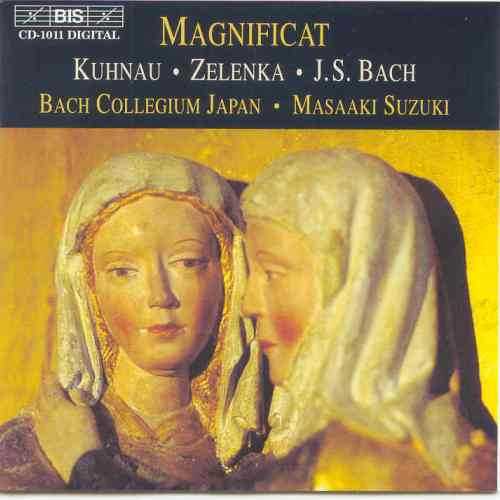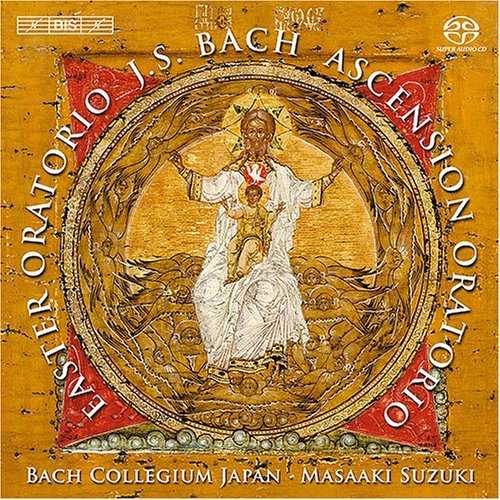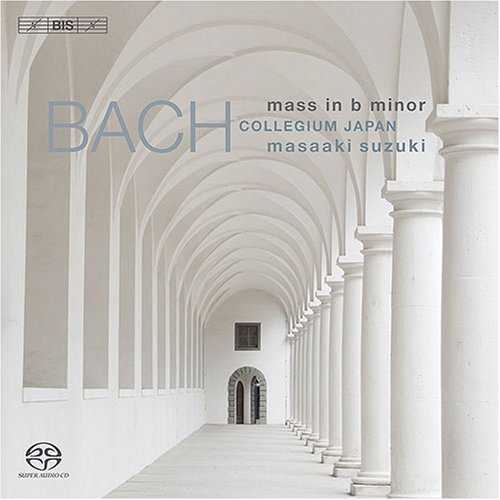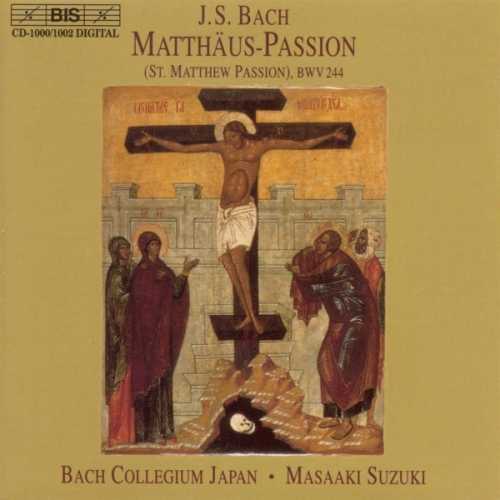
Performer: Yukari Nonoshita, Gerd Turk
Orchestra: Bach Collegium Japan Orchestra
Composer: Johann Sebastian Bach, Johann Kuhnau, Jan Dismas Zelenka
Audio CD
Number of Discs: 1
Format: FLAC (image+cue)
Label: Bis
Size: 314 MB
Recovery: +3%
Scan: yes
01. Magnificat for 5 voices & orchestra in C: Magnificat anima mea Dominum
02. Magnificat for 5 voices & orchestra in C: Et exultavit spiritus meus
03. Magnificat for 5 voices & orchestra in C: Quia respexit humilitatem
04. Magnificat for 5 voices & orchestra in C: QUia fecit mihi magna
05. Magnificat for 5 voices & orchestra in C: Et misericordia eius
06. Magnificat for 5 voices & orchestra in C: Fecit potentiam
07. Magnificat for 5 voices & orchestra in C: Deposuit potentes
08. Magnificat for 5 voices & orchestra in C: Esurientes implevit bonis
09. Magnificat for 5 voices & orchestra in C: Suscepit Irael
10. Magnificat for 5 voices & orchestra in C: Sicut locutus est
11. Magnificat for 5 voices & orchestra in C: Gloria Patri
12. Magnificat for 5 voices & orchestra in C: Sicut erat in principio
13. Magnificat for soprano, chorus, instruments & continuo in C major, ZWV 107: Magnificat anima mea dominum
14. Magnificat for soprano, chorus, instruments & continuo in C major, ZWV 107: Esurientes implevit bonis’
15. Magnificat for soprano, chorus, instruments & continuo in C major, ZWV 107: Magnificat/Gloria Patri
16. Magnificat for soprano, chorus, instruments & continuo in C major, ZWV 107: Amen
17. Magnificat for soprano, alto, chorus, instruments & continuo in D major, ZWV 108: Magnificat anima mea Dominum
18. Magnificat for soprano, alto, chorus, instruments & continuo in D major, ZWV 108: Suscepit Israel
19. Magnificat for soprano, alto, chorus, instruments & continuo in D major, ZWV 108: Amen
20. Magnificat, for 5 voices, 5-part chorus, orchestra & continuo in D major, BWV 243 (BC E14): Magnificat
Magnificence!
First the performance: Masaaki Suzuki and his Bach Collegium Japan do their best work on robust, broadly expressive works like these Magnificats — works that call for energy and a firm baton, and works that profit by the disciplined grandeur of the Collegium choir. In other words, these four Magnificats suit Suzuki’s strengths as a conductor. Even so, I don’t suppose many Bach fans would acclaim this performance to be their all-time favorite recording of the Bach Magnificat. What makes this CD particularly interesting is the juxtaposition of the oft-heard Bach with the seldom-heard Magnificat by Kuhnau and the two almost-never-heard Magnificats by Jan Dismas Zelenka.
Zelenka has something of a cult following that has promoted his reputation from the depths of oblivion to a stature among cognoscenti as the “Bohemian Bach” and one of the most progressive composers of his era. Zelenka (b. 1679) and Bach (b. 1685) were contemporaries, each certainly aware of the other’s music. Zelenka had probably the better job, as a court composer in the Saxon capital Dresden. Both Zelenka and Bach wrote some of their finest and most distinctive music quite late in their lives, and in both cases that music was largely met with inattention until the 20th C rediscovery of it. Zelenka’s two Magnificat settings are usually concise; all the text is set in a unified declamatory movement, followed by a flamboyant countrapuntal Amen nearly as long as the declamation. The Magnificat in D major does indeed sound more like Haydn than like Kuhnau or Bach, especially in the instrumental writing, which lends some credence to the idea of Zelenka as a progressive composer ahead of his generation. Be it so or not, both of these Magnificats are musically magnificent. Now that Zelenka has been rediscovered, he merits a much wider attention as in fact one of the most original composers of the Baroque.
On the other hand, Bach’s honor as a composer has been impugned in recent decades by the widespread and unaccountable accusation that he was a musical “conservative,” a provincial who had little influence on the next generation except through the agency of his sons. If Bach were truly conservative, unless the word ‘conservative’ has some occult mantric significance, what would his music sound like? This CD gives a possible answer; it would sound like that of Kuhnau, his immediate predecessor as cantor in Leipzig! Or perhaps it might sound more like that of Pachelbel or Buxtehude. Listening to the Magnificats of Zelenka and Bach side by side, I find they had much the same radical aspirations to create a music of monumental complexity, unifying the most operatic declamation with the most intricate counterpoint. Both men were progressive leagues ahead of their contemporaries, and even ahead of their successors in the evolution of a musical vocabulary that requires committed intellectual attention from its audience. Both were writing for the future; the chief difference seems to be that the “future” discovered Bach first.
The Kuhnau Magnificat is a charming, stately piece, full of ‘moments’ of musical intensity. It was wise for Suzuki to place it first on this CD, however, since after the Zelenkas and the Bach, you’ll find it hard to recall a note of the Kuhnau.
Trumpets, oboes, bassoons, and drums! If you enjoy the splendor of brass and the sparkle of oboes, the celebratory rumble of drums and the full-throated exuberance of a fine choir, this is a CD you will want.




Thanks Whatever.